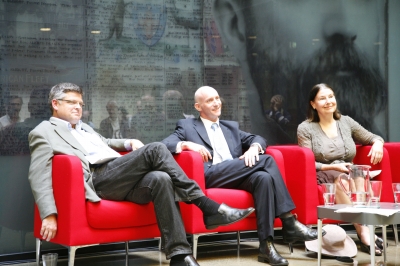Republic forum to enliven Australia Day
Research news
Will Australia ever become a republic?
That's the testy subject of a Deakin University forum to be broadcast around the nation on Australia Day.
And while he may not be happy with outcome of the forum – the status quo looks like being with us for some time - the selection of this day for such a lively discussion would have pleased Alfred Deakin, the person in whose honour the University is named.
Of a long ago Australia Day, he wrote:
“Our national holiday was observed this year with Australian wholeheartedness, but with a scant allowance of ceremony.
“What there was of that was English. We are miserable copyists in all such matters, and a luncheon with speeches marks the limit of our invention in the way of formal demonstrations.
“The first settlement in Australia and the foundation of New South Wales are honoured in this same fashion on January 26 each twelvemonths with deadly earnestness and on most occasions deadly dullness.”
The forum, titled “Yes We’re Still A Monarchy But It Is Not My Fault” was pre-recorded at the Geelong waterfront-based Alfred Deakin Research Institute late last year by ABC Radio National.
It featured author and lawyer Greg Barns - the man who replaced Malcolm Turnbull as head of the Australian Republican Movement - and leading Deakin Professors Marian Simms and Damien Kingsbury.
“The impetus for this debate was, in part, the poll that was conducted during the last Federal election,” said Deakin’s Deputy Vice-Chancellor Research, Professor Lee Astheimer.
“Surprisingly, the results indicated that more than a third of Australians don’t want Australia to become a republic ever.
“Given that in 1999, interest in becoming a republic was so great that Australia held a major referendum on the issue, we thought it was important to see why things have changed.”
According to Professor Simms, a leading expert in Australian political history and now the head of Deakin’s School of History and Heritage, not a lot has changed in more than 111 years, not just the past 11 or so.
She pointed out that as Australia’s second Prime Minister, Deakin, determined long ago that Australians’ fairy tale notions of the Monarchy would always over-ride any move to a republic.
“On his first trip to London, he actually met Queen Victoria,” Professor Simms said.
“And in a letter back to Australia he commented that because Australia was at such a distance from England it would always hold the Monarchy in high esteem because it couldn’t get close enough to see at that stage the unfortunate Queen was quite decrepit, hard of hearing and generally not the kind of romantic figure in all the early photographs and portraits of her that were above respectable middle-class mantle pieces in Kew and similar suburbs.”
Lawyers too, Professor Simms, said had to accept some of the blame for the way they drafted the Constitution.
“The Constitution is really devoted to political stability which is why it was designed to be rigid as well,” she said.
“It was almost as if the early politicians were saying gosh we hope it works.”
That rigidity, Professor Simms, says, explains why in the 111 years since Federation, just eight referenda in Australia have been successful.
Greg Barns was at pains to point out that as campaign director of the republican cause before the 1999 referendum, it was not his fault Australia was still at monarchy.
But rather than reflect on the past, he wanted to focus on new ways to bring about change and to get people to re-engage with the issue of Australia becoming a republic.
He says that rather than party political machines presenting models to the people, a new process of “deliberative democracy” should start with the people.
“To achieve general consensus and national unity on the type of republican model will require a sense of public ownership,” Barns said.
“Not only is your own voice heard in these public discussions but you have to hear others and you have to be confronted with the need to compromise.”
In his talk called ‘Mrs Strangequeen, or how I learned to stop worrying and love the Monarchy’ Professor Kingsbury took a Jacobite approach to the subject – “off with their heads!”
He also noted that unlike Australia, Ireland, India and Pakistan had all become republics.
“It seems they have each taken the advice that ‘the cure for admiring the monarchy is to go and look at it’.”
Which, one way or another, brings us back to Alfred Deakin!
Media contact: sandra.kingston@deakin.edu.au
Share this story
 The speakers (from left), Greg Barns, Professor Damien Kingsbury and Professor Marian Simms
The speakers (from left), Greg Barns, Professor Damien Kingsbury and Professor Marian Simms
